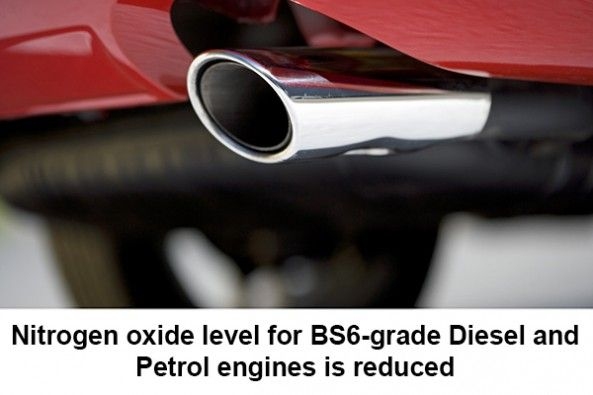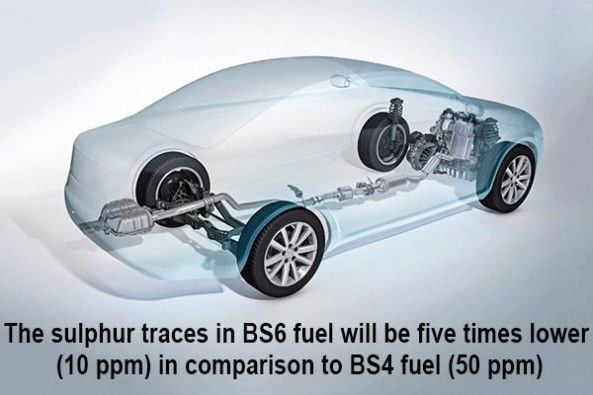General Help
Get information about our website or Droom services
Introduction to BS6 Emission Norms:
The Indian Ministry of Road Transport and Highways (MoRTH) issued a draft notification for the introduction of stringent Bharat Stage (BS) 6 Emission standards on February 19, 2016. The new vehicle emission norms apply to all major on-road vehicles categories in the country. These new emission standards came into force on April 1, 2020. The Bharat Stage norms are based on European emission regulations. With the adoption of norms this year, Indian vehicle pollution norms are at par with the European Union regulations for commercial vehicles, two-wheeler & four-wheeler, heavy-duty trucks and buses. This was a major step towards ensuring clean air for Indian citizens considering chronic exposure to air pollution which causes the death of 1.67 million Indians every year.

Main difference between BS-4 and BS-6 emission standards:
Both the emission standards - BS-4 and BS-6 are designed to reduce vehicle pollution in the country. The new BS-6 norms will reduce pollutants emitted from a vehicle’s exhaust in comparison to the older emission standards. Further, BS6 compliant fuel will emit lower Sulphur and Nitrogen Oxide content. The sulphur traces in BS6 fuel will be five times lower (10 ppm) in comparison to sulphur traces found in BS4 fuel (50 ppm). Also, Nitrogen oxide level for BS6-grade diesel engines and petrol engines has been reduced by 70 percent and 25 percent, respectively. With the implementation of BS-6 emission norms, all vehicles need to come fitted with Onboard Diagnostics (OD) mandatory.
Effect of BS6 emission standards on diesel vehicles:
BS6 compliant diesel vehicles cost went up due to modification in the exhaust system making it expensive in comparison to BS4 vehicles.
The important change in BS6 compliant vehicles is the addition of DPF (Diesel Particulate Filter) to lower the emission of soot.
Sulphur content emitted from the exhaust system would be on the lower side.
SCR (Selective Catalytic Reduction) device is added to diesel-powered vehicles to lower their NOx (Nitrogen Oxide) content.
Effect of BS6 emission standards on petrol vehicles:
With the addition of Electronic Fuel Injection (EFI), the cost of BS6 compliant petrol vehicles went high.
With the move to stricter BS6 emission norms, the petrol engine’s combustion process and emissions were reduced significantly.
Electronic Fuel Injection (EFI) replaced the outdated carburettor.
Fuel efficiency increased a notch higher thanks to better combustion in the engine.

BS6 Emission norms impact on performance and fuel efficiency:
Moving to stricter cleaner emission norms posed a lot of challenges to the automotive industry. The effect of cleaner BS6 fuel on performance and emissions will vary from vehicle to vehicle. The difference between BS4 and BS6 vehicle fuel efficiency is negligible. For example, the BS6 Maruti Dzire fuel mileage stands at 21.21 kmpl (ARAI certified) while the outdated BS4 Maruti Dzire provided an ARAI certified fuel efficiency of 22 kmpl. A slight decline in mileage should be expected but it wouldn’t be significant in any way. Also, the process to lower sulphur content in diesel will affect the energy content of the BS6 fuel. This would take a toll on diesel vehicle’s performance and longevity.
Overall, the move to BS6 Emission Norms was long overdue considering vehicle pollution which was posing to be hazardous for the citizens of the country. The new fuel is cleaner with a huge reduction in Sulphur and Nitrogen Oxide emissions. BS6 petrol vehicles can use BS4 fuel while BS4 vehicles using new BS6 fuel could face an issue with their engines. Prices of the new BS6 compliant vehicles have increased in comparison to older BS4 models but in the longer run, one can shell out extra money for keeping the environment safe.
Read Also: Domestic vs Foreign Car Brands in India